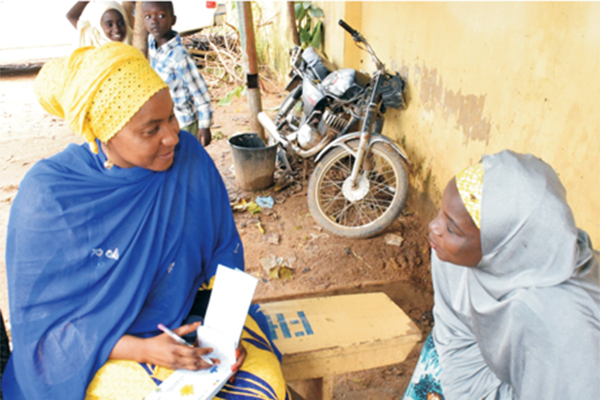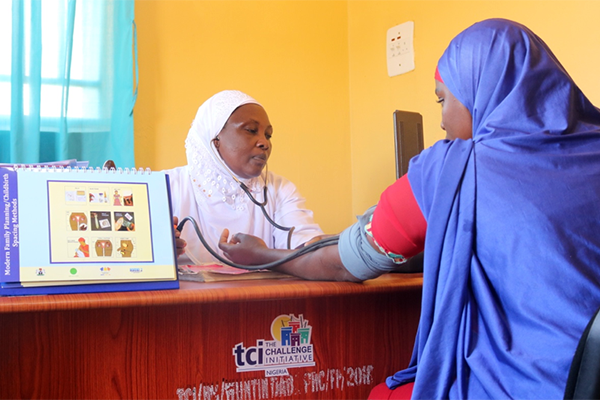Nigeria Toolkit: Monitoring, Evaluation & Learning
- Home
- Help and Support
- Close
- Toolkits
- Global Toolkit
- AYSRH Toolkit
- Hub Toolkits
- Core High-Impact Practices
- Gender Essentials Mini Course
- Close
- Resource Collection
- Community of Practice
- Coaching
- Log In/Register
- My Profile
- English
 Data Quality Assessment
Data Quality Assessment
What is it?
TCI’s family planning (FP) program depends on data for evidence to measure progress before and during the project implementation phase, and advocates for the use of data for decision making in the State beyond its lifetime. As a result, there is a need to strengthen the capacity of personnel in charge of data management in the State to ensure availability of quality data which may be used for decision making.
Two routine monitoring and evaluation (M&E) activities that consistently ensure the quality of reported data are regular data record review meetings and/or periodic data quality assessments (DQAs). Consequently, TCI supports the State M&E team to conduct periodic DQAs, thereby building their capacity in data quality assessment processes and ensuring the operationalization of the integrated FP checklist, as well as identifying and addressing gaps in data management at the State. The State M&E team includes the M&E officers at the State-level and of TCI-supported local government areas (LGAs). Subject to availability of funds, M&E officers from other LGAs – which are not part of the TCI – may be included in the capacity strengthening training of the DQA team.
Following the training, the State and LGA M&E team will have the capacity to conduct quarterly DQAs and consequently expand it to non-TCI supported facilities and LGAs through step-down trainings and mentoring.
The objectives of the DQA are as follows:
- To assess the availability, consistency, and validity of reported reproductive health data.
- To strengthen the ability of State/LGA M&E personnel to assess and query FP data collection processes for quality.
- To strengthen FP providers’ ability to collate quality data.
How to Conduct a Data Quality Assessment
In conducting DQA, data collection tools within the health facility, such as daily consumption record form, daily FP register, and FP client cards, are assessed for three main parameters:
- Data availability: This is a check to identify if the data tools are available, if they are completed and correctly filled out.
- Data consistency: Data consistency is a check to ensure that the data tools are filled the same way from month to month.
- Data validity: This is a check to see if the data is accurately collated and transferred from tool to tool, for instance, from the daily register to the monthly summary form.
Data availability and data consistency are assessed using a DQA checklist, while data validity is assessed using facility FP data extracted from the district health information system (DHIS) 2 platform.
There are three main phases in conducting DQA: the preparatory phase, the assessment and analysis phase, and the dissemination phase.
Preparatory Phase
This phase happens before the team goes to the sites for the assessment. This includes:
- Make ready the checklist and DQA tools: The family planning DQA checklist is the main tool used to assess data quality. It allows the assessor to input specified scores based on certain criteria or questions listed in the tool, such as ‘Were all data entries for each month completely and correctly filled?’
- Pull facility data for the period of assessment from the DHIS 2.
- Conduct a DQA training and planning meeting with the assessors: The assessment team comprises of State and LGA M&E officers with support from TCI’s research, monitoring and evaluation (RM&E) technical support. The assessment team should be well-trained in the administration of the DQA tool. The training will entail presentations, document reviews, and role plays to ensure adequate capacity strengthening of the assessment team.
- Divide the assessors into small teams of 2-3 persons and assign the facilities to be visited.
- Notify the facilities of the visitation dates.
- Make logistics provision for the assessment team. Plan to visit not more than 2 facilities in a day and prepare to spend an average of 4 hours in each facility.
Assessment and Analysis Phase
This phase includes the two main activities:
- Visit the facilities and administer the checklists. The team will review the daily consumption record forms, daily FP register, and FP client cards, and input appropriate scores on the DQA checklist.
- Compute the scores and identify gaps. At the end of the assessment, the scores for each facility are entered in an Excel sheet and computed. Aggregate scores for the LGA are also computed. Data entry and computation are done by the State and LGA M&E officers as part of capacity strengthening and transfer. The M&E officers learn by doing. This also helps to ensure that these steps become regular aspects of their job responsibilities, carrying out the assessment on a quarterly basis.
Dissemination Phase
This phase includes the following two activities:
- Disseminate the results of the assessment, commending the best performers. The outcome of the assessment should be disseminated to stakeholders who are most suitable in addressing the identified gaps/issues. The stakeholders include: facility Officers-in-charge (OICs), LGA M&E officers, state HMIS officer, and program officers. The facility with the highest score in each LGA, and the LGA with the highest score should be commended.
- Develop and execute plan on addressing the identified gaps. The weak aspects, where most facilities score low should be noted and addressed. A detailed plan to address the identified gaps should be developed and its execution should be monitored.
TCI APP USERS PLEASE NOTE
You will only receive CERTIFICATES by email – when earning a score above 80% – and will not be able to view or print a certificate PDF from the TCI app.
Test Your Knowledge
Earn a Certificate
Quiz Summary
0 of 5 Questions completed
Questions:
Information
You have already completed the quiz before. Hence you can not start it again.
Quiz is loading…
You must sign in or sign up to start the quiz.
You must first complete the following:
Results
Results
0 of 5 Questions answered correctly
Your time:
Time has elapsed
You have reached 0 of 0 point(s), (0)
Earned Point(s): 0 of 0, (0)
0 Essay(s) Pending (Possible Point(s): 0)
Categories
- Not categorized 0%
- 1
- 2
- 3
- 4
- 5
- Current
- Review
- Answered
- Correct
- Incorrect
-
Question 1 of 5
1. Question
A Data Quality Assessment checklist is used to assess data availability and data consistency.
CorrectIncorrect -
Question 2 of 5
2. Question
A training on capacity strengthening for the assessment team focuses on:
CorrectIncorrect -
Question 3 of 5
3. Question
Stakeholders who can help address gaps in data collection include:
CorrectIncorrect -
Question 4 of 5
4. Question
How useful did you find the information and/or tools presented on this page? Please write your response in the box below using one of the following phrases: Very useful, Useful, Somewhat useful, Not useful.
Feel free to comment on why you made that choice.
-
This response will be awarded full points automatically, but it can be reviewed and adjusted after submission.
Grading can be reviewed and adjusted.Grading can be reviewed and adjusted. -
-
Question 5 of 5
5. Question
How do you intend to use the information reviewed and/or tools that you accessed?
-
This response will be awarded full points automatically, but it can be reviewed and adjusted after submission.
Grading can be reviewed and adjusted.Grading can be reviewed and adjusted. -






